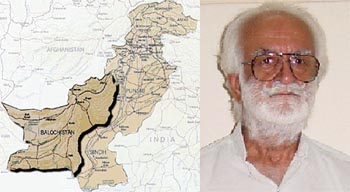Dec 30, 2025
Dec 30, 2025
by Ramesh Menon
 There is one shadow in Pakistan that is getting longer whenever President Pervez Musharraf is looking at it. It is the ghost of 82-year-old Baluchistan leader, Nawab Akbar Khan Bugti, who was recently killed by Pakistan army commandoes. His assassination raised a banner of revolt in Baluchistan uniting warring tribal leaders against Musharraf.
There is one shadow in Pakistan that is getting longer whenever President Pervez Musharraf is looking at it. It is the ghost of 82-year-old Baluchistan leader, Nawab Akbar Khan Bugti, who was recently killed by Pakistan army commandoes. His assassination raised a banner of revolt in Baluchistan uniting warring tribal leaders against Musharraf.
04-Oct-2006
More by : Ramesh Menon